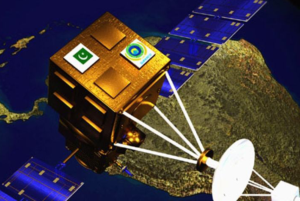
Pakistan’s national space agency, the Space and Upper Atmospheric Research Commission (SUPARCO), announced on October 4, 2017, that it expects the first Pakistani dual-use Earth observation satellite, Pakistan Remote Sensing Satellite 1 (PRSS-1), and an experimental satellite, will be launched in March 2018.
The launch of PRSS-1 has a potential impact on Middle Eastern geopolitics given the economic dependence of Pakistan on Gulf Arab states, particularly Saudi Arabia, and the close, but recently troubled, security relationship between Riyadh and Islamabad.
The announcement was made in Islamabad by Qaiser Anees Khurram, Chairman of SUPARCO, at the start of Pakistani celebrations of World Space Week. Khurram said, “Our first optical remote sensing satellite is all set to be launched in 2018…Pakistan Remote Sensing Satellite (PRSS-1) will make Pakistan self-reliant in multi-spectral imaging. Remote sensing satellite will have multiple benefits and practical applications, including agriculture, disaster management, urban planning, forestry, water management, weather forecast and other areas.”
A number of Pakistani officials have also intimated that PRSS-1, and its possible successors, will be used for national security purposes as well, such as intelligence gathering, border security, and general surveillance.
PRSS-1 has been built by Chinese satellite manufacturer China Academy of Space Technology (CAST), and China Great Wall Industries Corporation will launch the satellite in March 2018. The PRSS-1 satellite is similar to the one built for Venezuela by CAST, called the Antonio José de Sucre, launched on October 8, 2017, from the Jiuquan launch site in China.
Pakistan’s only satellite in orbit, a communications satellite called PakSat-1R, was also mentioned by Khurram, “Our communication satellite Paksat-1R is up and running with efficient provision of communication and broadcast services throughout the country and neighbouring regions.”
Pakistan and China signed an agreement for PRSS-1 in 2016, and includes provisions for technology transfer to Pakistani engineers and scientists.
Despite relatively strong economic growth, some critics have charged that Pakistan should not spend money on a space programme due to chronic corruption in Pakistani officialdom, poor governance, and vast inequalities in wealth between Pakistani elites and the rest of the population.
These criticism are rejected by SUPARCO official Ayaz Aziz, who said, “Suparco has substantially contributed to natural resource management and environment modelling through glacier monitoring, land cover classification of Pakistan, land information system, national environment information management system.”
Original published at: https://spacewatch.global/2017/10/pakistan-launch-first-earth-observation-satellite-2018/
 SpaceWatch.Global An independent perspective on space
SpaceWatch.Global An independent perspective on space

